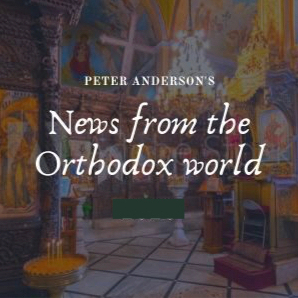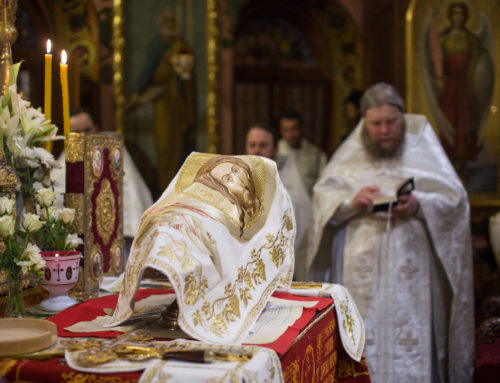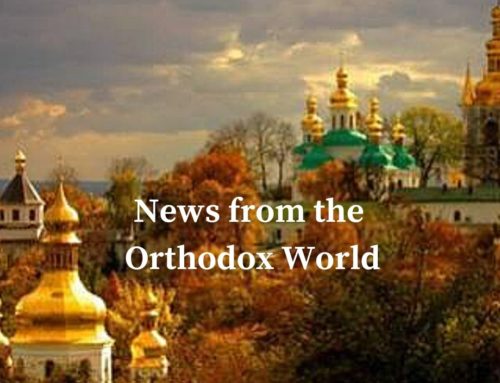Peter Anderson reports from the Orthodox world.
Longstanding reporter of the news from the Eastern Church, Peter Anderson shares our dream of a unified Christianity. His love for Orthodoxy has driven him to this personal mission to share the news of East with the world through his email list. The Urbi et Orbi Foundation is proud to share his efforts and his insights with you.

As you recall, Patriarch Kirill in his Christmas interview stated that he has information that Patriarch Bartholomew “was under pressure from powerful political forces emanating from one of the world superpowers.” According to Patriarch Kirill, the Patriarch Bartholomew did not have the fortitude to say “no,” and this led to the Ecumenical Patriarchate’s actions in Ukraine. According to Patriarch Kirill, “the intention is quite simple: tear the Russia Church away from the Orthodox Christians of Greece, the Arab world, and the Middle East so that Orthodoxy itself would be become weaker.” https://mospat.ru/en/2021/01/07/news189972/
On January 18, Russian Foreign Minister Sergey Lavrov gave a major news conference in Moscow on the results of Russian diplomacy in 2020 and answered the questions of journalists. The official English translation of the news conference is found at https://www.mid.ru/en/foreign_policy/news/-/asset_publisher/cKNonkJE02Bw/content/id/4527635 . In answering a question regarding Russian relations with Greece and Cyprus, the Foreign Minister made reference to Ecumenical Patriarch Bartholomew and made statements very similar to those previously made by Patriarch Kirill. The following is the text relating to that part of the answer:
I have recently visited Greece and Cyprus. Moreover, I have recently talked with Foreign Minister of Cyprus Nikos Christodoulides by telephone. I can see no reason why these countries should be persuaded that Russia is an enemy of theirs or has carried out an unfriendly policy towards them. Someone is trying to convince them, but politicians with common sense can see the whole truth: that they are only trying to make an enemy out of the Russian Federation and saying that our presence in the Balkans prevents these countries from moving into NATO, hinders their Euro-Atlantic integration.
There is no diplomacy here, only crude public leverage. Not everyone in such countries as Cyprus and Greece can publicly respond to such battle cries because they are scared to offend “Big Brother.” There is no underlying enmity between anyone in Russia, Greece and Cyprus.
We have very warm and close relations, a spiritual connection. Our American colleagues are actively trying to undermine this spiritual connection: they made Ecumenical Patriarch Bartholomew follow the path of schism, undermining centuries-old traditions of Orthodox Christianity, the path called Popery. It has always been rejected by the Eastern Orthodox Church. It is a reason that there is no analogue of the Pope in the Orthodox world. There is the Ecumenical Patriarch, who until recently was revered as the first among equals. Under the gross and open pressure from Washington, he chose schism in Ukraine creating a puppet Orthodox Church of Ukraine and deceived the Church by cutting off the rights promised to it. Now, together with the Americans, he is trying to work on other Orthodox churches, including the Greek Orthodox Church and the Primate of the Cypriot Orthodox Church, in order to continue deepening these subversive anti-canonical actions against Eastern Orthodoxy. The Pandora’s Box Bartholomew opened has already led to a split in the Cypriot Orthodox Church and unrest in other Orthodox churches. The mission the Americans have assigned to him (they do not even hide that they are actively working with him under the slogan of “freedom of religion and confession”) is to bury Orthodoxy’s influence in today’s world. I can see no other explanation for his actions.
Also on January 18, an important article authored by Cardinal Kurt Koch was published in the Vatican newspaper L’Osservatore Romano on the occasion of the Week of Prayer for Christian Unity, January 18 to 25. https://www.osservatoreromano.va/it/news/2021-01/quo-013/camminare-insieme-br-sulla-stessa-via.html (in Italian, but translates well with the Google translation tool) The article focuses on synodality from an ecumenical point of view and is entitled, “Walk together on the same path.” The article first reminds us that the “great” 1700th anniversary of the first ecumenical council, Nicaea, will be celebrated in 3025. According to Cardinal Koch, this first ecumenical council “documents the way in which controversial issues are discussed and resolved synodally in a council in the Church.” One section of the article discusses the emphasis placed by Pope Francis on synodality, and other sections discuss synodality and primacy in the Catholic-Orthodox dialogue. The Cardinal points out that the Ravenna document (https://www.christianunity.va/content/unitacristiani/en/dialoghi/sezione-orientale/chiese-ortodosse-di-tradizione-bizantina/commissione-mista-internazionale-per-il-dialogo-teologico-tra-la/documenti-di-dialogo/testo-in-inglese.html ), adopted by the Joint International Commission for Theological Dialogue between the Orthodox and Catholic Churches (without the participation of the Moscow Patriarchate) in 2007, recognized the need for a protos at the universal level. The Cardinal also observes:
On the part of the Orthodox Churches, we can instead expect that, in ecumenical dialogue, they will come to recognize that primacy at the universal level is not only possible and theologically legitimate, but also necessary. The intra-Orthodox tensions, which emerged in a particularly evident way on the occasion of the Holy and Great Synod of Crete in 2016, should make us understand the need to consider a ministry of unity also at the universal level of the Church, which obviously should not be limited to a simple honorary primacy, but it should also include legal elements. Such a primacy would in no way contradict Eucharistic ecclesiology, but would be compatible with it, as is often recalled by the Orthodox theologian and metropolitan John D. Zizioulas.
It is not surprising that Cardinal Koch favors the view of Constantinople on the issue of whether the Ecumenical Patriarch possesses certain legal powers and not simply honor alone. A goal of the Pontifical Council for Promoting Christian Unity, which Cardinal Koch heads, is to restore eucharistic unity between the Orthodox and Catholic Churches. No one expects that the Orthodox will ever adopt a view of universal primacy with the great powers possessed by a Catholic pope. However, if the Ecumenical Patriarch’s has certain limited legal powers and not simply primacy, there is the hope that the fact that the Catholic protos has far greater powers that the Orthodox protos may not be deemed a difference so great as to prevent the restoration of eucharistic unity.
On January 20 Pope Francis devoted his address at his general audience to the week of prayer for Christian unity. https://www.vatican.va/content/francesco/en/audiences/2021/documents/papa-francesco_20210120_udienza-generale.html (text of address in English). The Pope’s remarks included the following:
To pray means to fight for unity. Yes, fight, because our enemy, the devil, is the one who divides, as the word itself says. Jesus asks the Holy Spirit for unity, to create unity. The devil always divides. He always divides because it is convenient for him to divide. He fosters division everywhere and in any way, while the Holy Spirit always joins in unity. In general, the devil does not tempt us with high theology, but with the weaknesses of our brothers and sisters. He is astute: he magnifies others’ mistakes and defects, sows discord, provokes criticism and creates factions. God has another way: He takes us as we are, He loves us so much, but He loves us as we are and takes us as we are; He takes those of us who are different, He takes sinners, and He always nudges us towards unity.
In other news, the Parliament of Montenegro today approved for a second time the amendments to the controversial law on religion. https://www.cdm.me/politika/skupstina-usvojila-sve-zakone-koje-je-dukanovic-vratio-na-ponovno-odlucivanje/ As you recall, President Milo Đukanović had returned the amendments, first passed on December 29, to parliament because of alleged procedural irregularities that occurred at the first session. Presumably, those irregularities have now been cured. See also https://balkaninsight.com/2021/01/20/montenegros-president-flexes-muscles-with-new-government/
Metropolitan Simeon, one of the two metropolitans who left the UOC-MP to join the OCU, has given a very long interview to RISU. https://risu.ua/mitropolit-simeon-yedina-avtokefalna-pravoslavna-cerkva-v-ukrayini-bude—za-mogo-zhittya_n115105 It appears to be a very candid interview including a description of the great number of parishes that he lost as a result of the transition. Simeon discusses the “unifying council” and many aspects of the current religious disputes in Ukraine. The long interview is worth reading in its entirety.
In Minsk, Archbishop Kondrusiewicz celebrated on January 15 a special Mass at the Catholic cathedral in memory of Metropolitan Filaret. https://catholic.by/3/news/belarus/12735-u-minskaj-arkhikatedry-pamalilisya-za-spachylaga-mitrapalita-filareta It was the day of the burial of the Metropolitan at the Zhirovichi Monastery. The personal friendship between Filaret and Kondrusiewicz is captured at 8:00 is the following video of persons congratulating Metropolitan on the occasion of his 85th birthday on March 21, 2020. https://www.youtube.com/watch?v=9rckCPbIhGs
In Zagreb, there was a cordial meeting on January 12 between Cardinal Josip Bozanic of Zagreb and Orthodox Metropolitan Porfirije of Zagreb and Ljubljana, who may be the next Serbian patriarch. https://www.spc.rs/eng/meeting_between_metropolitan_porfirije_and_cardinal_bozanic_overcome_all_difficulties_together They discussed the pandemic and recent earthquake. The Cardinal stated that the meeting was occurring on the eve of the Octave for Christian Unity and that “the Catholic Church has much in common with the believers of Serbian nationality and the Serbian Orthodox Church.” Metropolitan Porfirije stated that if “we recognize our neighbor in the other, then the difficulties, whatever they may be, will at least be easier.”
Peter Anderson, Seattle USA


